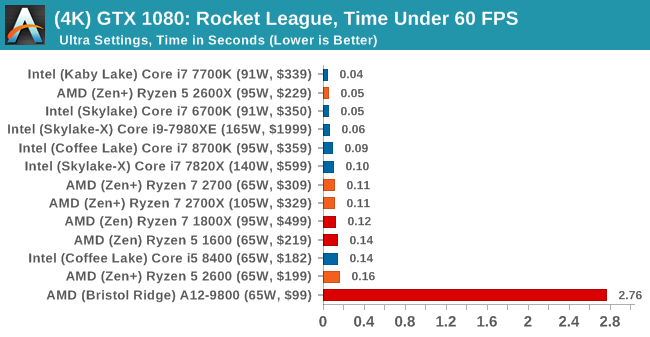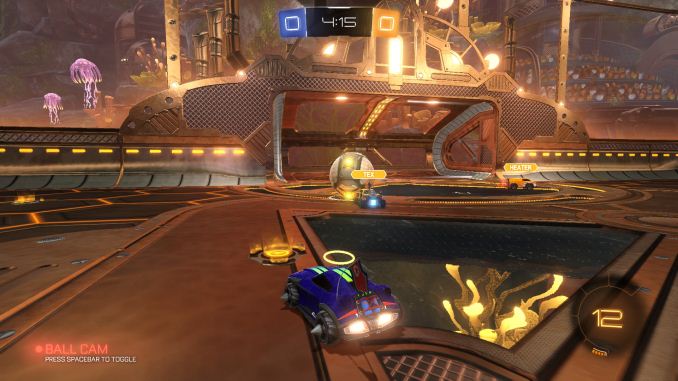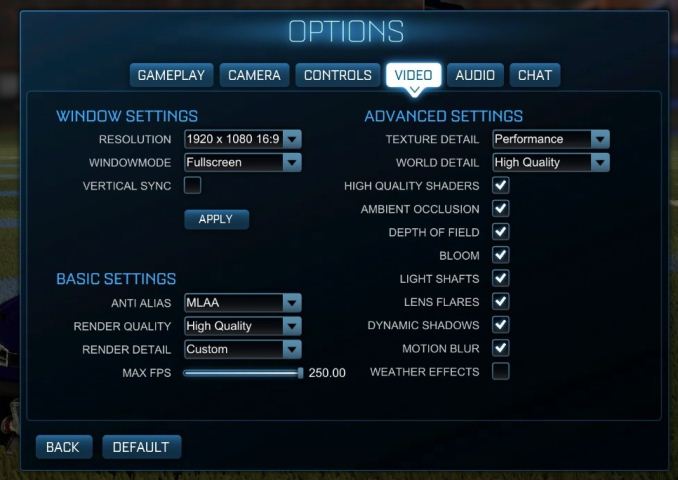The AMD 2nd Gen Ryzen Deep Dive: The 2700X, 2700, 2600X, and 2600 Tested
by Ian Cutress on April 19, 2018 9:00 AM ESTRocket League
Hilariously simple pick-up-and-play games are great fun. I'm a massive fan of the Katamari franchise for that reason — passing start on a controller and rolling around, picking up things to get bigger, is extremely simple. Until we get a PC version of Katamari that I can benchmark, we'll focus on Rocket League.
Rocket League combines the elements of pick-up-and-play, allowing users to jump into a game with other people (or bots) to play football with cars with zero rules. The title is built on Unreal Engine 3, which is somewhat old at this point, but it allows users to run the game on super-low-end systems while still taxing the big ones. Since the release in 2015, it has sold over 5 million copies and seems to be a fixture at LANs and game shows. Users who train get very serious, playing in teams and leagues with very few settings to configure, and everyone is on the same level. Rocket League is quickly becoming one of the favored titles for e-sports tournaments, especially when e-sports contests can be viewed directly from the game interface.
Based on these factors, plus the fact that it is an extremely fun title to load and play, we set out to find the best way to benchmark it. Unfortunately for the most part automatic benchmark modes for games are few and far between. Partly because of this, but also on the basis that it is built on the Unreal 3 engine, Rocket League does not have a benchmark mode. In this case, we have to develop a consistent run and record the frame rate.
Read our initial analysis on our Rocket League benchmark on low-end graphics here.
With Rocket League, there is no benchmark mode, so we have to perform a series of automated actions, similar to a racing game having a fixed number of laps. We take the following approach: Using Fraps to record the time taken to show each frame (and the overall frame rates), we use an automation tool to set up a consistent no-bot match on easy, with the system applying a series of inputs throughout the run, such as switching camera angles and driving around.
It turns out that this method is nicely indicative of a real match, driving up walls, boosting and even putting in the odd assist, save and/or goal, as weird as that sounds for an automated set of commands. To maintain consistency, the commands we apply are not random but time-fixed, and we also keep the map the same (Aquadome, known to be a tough map for GPUs due to water/transparency) and the car customization constant. We start recording just after a match starts, and record for 4 minutes of game time (think 5 laps of a DIRT: Rally benchmark), with average frame rates, 99th percentile and frame times all provided.
The graphics settings for Rocket League come in four broad, generic settings: Low, Medium, High and High FXAA. There are advanced settings in place for shadows and details; however, for these tests, we keep to the generic settings. For both 1920x1080 and 4K resolutions, we test at the High preset with an unlimited frame cap.
All of our benchmark results can also be found in our benchmark engine, Bench.
MSI GTX 1080 Gaming 8G Performance
1080p



4K
















545 Comments
View All Comments
techguymaxc - Thursday, April 19, 2018 - link
Either you don't have a fast enough GPU to remove the GPU bottleneck or there's something wrong with your data because there is NO chance Ryzen is faster than *lake in GTA V, with lower IPC and clocks.Don't get me wrong, Ryzen 2 looks like a good product family and I wouldn't discourage anyone from buying.
SaturnusDK - Thursday, April 19, 2018 - link
As everyone else that are misreading the results. Tests are done at stock speeds and no overclocking.LurkingSince97 - Thursday, April 19, 2018 - link
Yes there is.Stock CPU and RAM speeds. Fully spectre / meltdown patched on both sides. Who is re-using old results? This review re-uses old results for the older generation Ryzen, and so some of the performance boost could be false (new drivers, OS patches, firmware, bios....).
More investigation is needed on all sides. Many other review sites are significantly more lazy than AT and are likely recycling old results for the Intel side.
As for your GPU bottleneck.... um no. Look at the results, as the resolution goes up, THEN you get GPU bottlenecked and all CPUs look the same. At low resolutions, it is clearly not GPU bottlenecked as there is a big FPS difference by CPU.
jaydee - Thursday, April 19, 2018 - link
Great review. Curious to see how things scale down for a 35W TDP part compared to Intel's latest 35W TDP CPUs.SaturnusDK - Thursday, April 19, 2018 - link
Gamers Nexus have tested the 2700X to work at 1.175V locked to 4.1GHz where it consumes 129W compared to stock frequency and stock voltage where it consumes 200W. Performance is generally the same on average.Flunk - Thursday, April 19, 2018 - link
Wow, that single-thread performance delta sure has shrunk hasn't it? Between meltdown and higher core clocks on the Zen+.mapesdhs - Saturday, April 21, 2018 - link
Wonder whether it won't be that much longer until AMD launches something which actually beats Intel in IPC. Atm, people keep saying Intel wins on IPC, but it's only because Intel has punched its clock rates through the roof (it's like the old P4 days again), something they could have done years ago but never bothered because there was no competition, just as they could have released a consumer 8-core long ago but didn't (the 3930K was a crippled 8-core, but back then AMD couldn't even beat mainstream SB, never mind SB-E).mkaibear - Monday, April 23, 2018 - link
You know IPC is "instructions per clock", yeah? So saying Intel wins on IPC because their clock rate is faster doesn't make sense, it's like saying UK cars have a higher mpg then US cars because their gallons are bigger.Intel wins (won?) on IPC because they executed more instructions per MHz of the clock rate. When you couple that with a faster clock rate you get a double whammy of performance. It does appear that AMD has almost closed the door on IPC but is still not operating on as high a clock rate.
Targon - Monday, April 23, 2018 - link
This is why many are looking forward to Zen 2 in 2019, which will have true design improvements compared to Zen and Zen+. Zen+ is a small and incremental improvement over Zen(first generation Ryzen chips). Combined with 7nm, we may very well see AMD get very close to Intel clock speeds while having very similar, if not better IPC and a higher core count.MajGenRelativity - Thursday, April 19, 2018 - link
Looks like a good review. Glad to see AMD closing the performance gap even further!